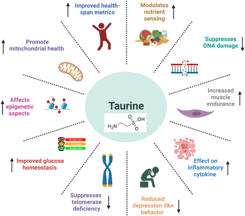Taurine's Role in Aging Questioned by Latest Research
A recent study published in the journal Science casts doubt on the efficacy of taurine as a biomarker of aging and its potential benefits for longevity through supplementation. Previously, some studies had suggested that taurine, an amino acid, declines with age and could serve as a viable target for anti-aging therapies. However, this new research challenges those notions, revealing that circulating levels of taurine do not decrease with age in humans or several other mammalian species.
Key Findings of the Study
- Circulating taurine levels remained stable or even increased among women as they aged, contrary to earlier hypotheses.
- Individual differences in taurine levels were found to be more pronounced than variations seen over the lifespan, complicating its reliability as a marker for aging.
- The correlation between taurine levels and health status is influenced by various factors including species, age, and group context, which weakens the belief that lower taurine levels indicate aging.
Dr. Luigi Ferrucci, a leading researcher at the National Institute on Aging, emphasized the overall takeaway from the findings: “At the current state of our knowledge, there is no supplement that truly improves longevity or health.” He advised that maintaining a balanced diet should be prioritized over reliance on supplements.
The Complex Role of Taurine
Taurine is known for its involvement in essential biological functions including the conjugation of bile acids, cellular redox processes, osmoregulation, membrane stabilization, and modulation of calcium signaling. Although taurine supplementation has been linked to potential benefits in combating oxidative stress, inflammation, and may assist in glucose regulation and cholesterol homeostasis, clinical trial results have been inconsistent.
Mixed Evidence on Taurine Supplementation
While some evidence suggests that taurine may have a positive impact on cardiovascular diseases and certain metabolic markers, studies also indicate diverse outcomes regarding physical performance. This inconsistency in findings raises questions about how effective taurine might be when used as a therapeutic supplement.
Widely Varying Results Across Species and Individuals
In this comprehensive investigation, researchers assessed taurine levels across various living models—mice, nonhuman primates, and diverse groups of healthy humans—utilizing repeated measurements within the same individuals for accuracy. The findings present a complex landscape of taurine levels, showing significant variation among individuals and no straightforward association linking taurine levels to health outcomes.
In summary, this research implies that the assumption of low circulating taurine acting as a definitive biomarker for aging is likely unfounded. Furthermore, any potential for taurine supplementation to delay aging or treat associated conditions is likely influenced by specific context, making broad claims about its efficacy premature.
Bias Analysis
Key Questions About This Article




